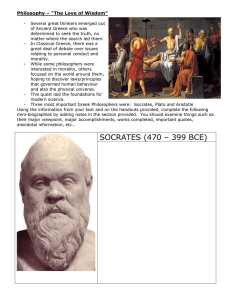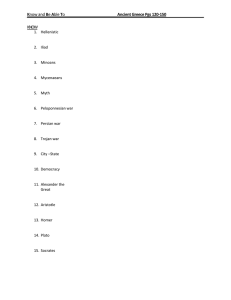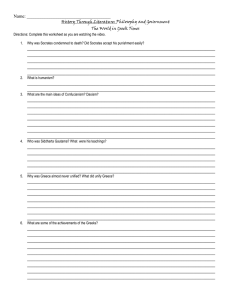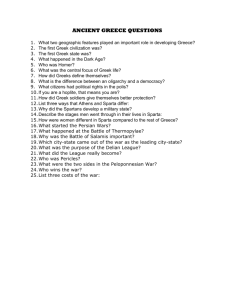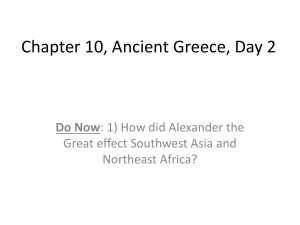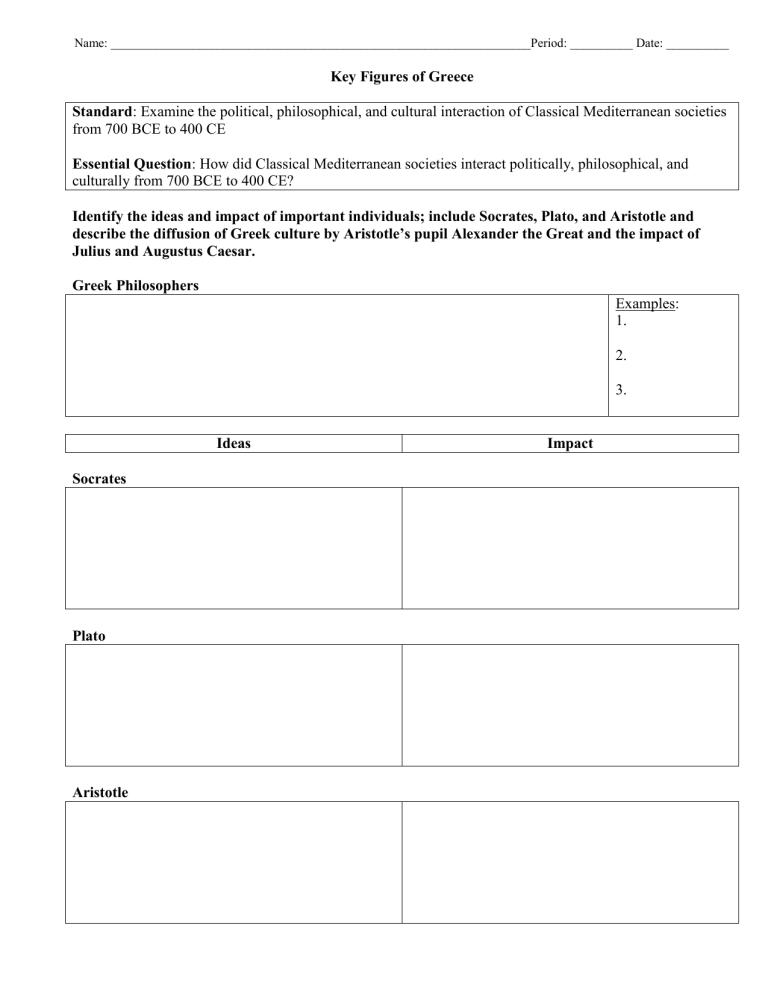
Name: ___________________________________________________________________Period: __________ Date: __________ Key Figures of Greece Standard: Examine the political, philosophical, and cultural interaction of Classical Mediterranean societies from 700 BCE to 400 CE Essential Question: How did Classical Mediterranean societies interact politically, philosophical, and culturally from 700 BCE to 400 CE? Identify the ideas and impact of important individuals; include Socrates, Plato, and Aristotle and describe the diffusion of Greek culture by Aristotle’s pupil Alexander the Great and the impact of Julius and Augustus Caesar. Greek Philosophers Examples: 1. 2. 3. Ideas Socrates Plato Aristotle Impact Essential Question: How did Classical Mediterranean societies interact politically, philosophical, and culturally from 700 BCE to 400 CE? Unification of Greece Alexander the Great Analyze the contributions of Hellenistic and Roman culture; include law, gender, and science. The Hellenistic Era Description: Impact: Key Figures of Greece Standard: Examine the political, philosophical, and cultural interaction of Classical Mediterranean societies from 700 BCE to 400 CE Essential Question: How did Classical Mediterranean societies interact politically, philosophical, and culturally from 700 BCE to 400 CE? Identify the ideas and impact of important individuals; include Socrates, Plato, and Aristotle and describe the diffusion of Greek culture by Aristotle’s pupil Alexander the Great and the impact of Julius and Augustus Caesar. Greek Philosophers “love of wisdom” refers to an organized system of rational thought early Greek philosophers concerned with the nature of the universe three of the greatest philosophers of the Western world 4. Socrates 5. Plato 6. Aristotle Socrates developed the Socratic Method o a question-and-answer format to lead pupils to understand things for themselves o based on the belief that knowledge is already present within each of us “the unexamined life is not worth living” o the belief in the individual’s ability to reason o important contribution of Greek thought killed for “corrupting the youth” Plato one of Socrates’ students considered to be the greatest Western philosopher The Republic: explained Plato’s views on government believed that people could not achieve a good life unless they lived in a just and rational state ideal state has three groups—rulers, warriors, and commoners o led by a philosopher-king o men and women would have the same education and equal access to all positions established a school in Athens called the Academy Aristotle Plato’s most important pupil studied at the academy for 20 years wide-range of interests including ethics, logic, politics, poetry, astronomy, geology, biology, and physics found three forms of government: monarchy, aristocracy, and constitutional government(preferred) Lyceum Essential Question: How did Classical Mediterranean societies interact politically, philosophical, and culturally from 700 BCE to 400 CE? Unification of Greece Greeks viewed the Macedonians as barbarians Philip II became king of Macedonia in 359 B.C. Macedonia defeated Greece at the Battle of Chaeronea in 338 B.C. Greek city-states united in a league under Macedonian control Philip was assassinated Alexander the Great Philip’s son became king of Macedonia at age 20 334 B.C. began invasion of the Persian Empire 331 B.C. conquered all of the Persian Empire 327 B.C. moved through modern Pakistan into India 323 B.C. Alexander died after his return to Babylon at 32 years old Analyze the contributions of Hellenistic and Roman culture; include law, gender, and science. The Hellenistic Era Description: created by Alexander the expansion of Greek language and ideas to the non-Greek world of Southwest Asia and beyond Alexander’s empire fell apart after his death Four Hellenistic kingdoms emerged: Macedonia, Syria, Pergamum, and Egypt all eventually conquered by the Romans rulers encouraged Greek colonization in Southwest Asia new cities recruited architects, engineers, dramatists, and actors, as well as civilian administrators and soldiers helped to spread Greek culture as far as modern Afghanistan and India Impact: Alexandria, home to scholars of many different kinds Founding and rebuilding cities created opportunities for Greek architects and sculptors in the Hellenistic kingdoms. Thousands of statues were erected. Hellenistic sculptors moved away from classical ideals and created more emotional and realistic art.
